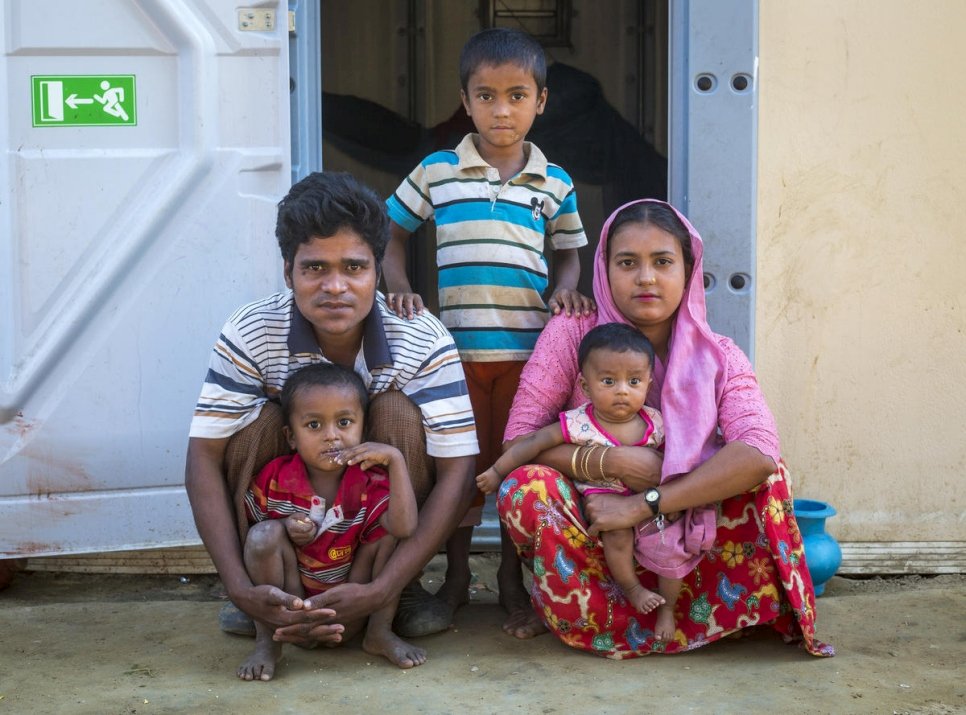Public health response in Rohingya refugee settlements on alert as first coronavirus case confirmed
This is a summary of what was said by UNHCR spokesperson Andrej Mahecic – to whom quoted text may be attributed – at today's press briefing at the Palais des Nations in Geneva.
UNHCR, the UN Refugee Agency, and partner organizations have further intensified their COVID-19 response in the Rohingya refugee camps in the Cox’s Bazar area of Bangladesh, following the first confirmed case of coronavirus among the refugee population yesterday. Since March, UNHCR and partners have been supporting the Government of Bangladesh primarily in COVID-19 preparation and prevention efforts. With this first confirmed case, response mechanisms have now been activated and will require additional international support.
According to the Government of Bangladesh, one Rohingya refugee has tested positive for COVID-19 in the Kutupalong refugee settlement in Bangladesh. In addition, one member of the local Bangladeshi host community has also tested positive. Both had approached health facilities run by humanitarian partners, where samples were taken. These were subsequently tested in the IEDCR Field Laboratory in Cox’s Bazar.
Following the laboratory confirmation, Rapid Investigation Teams have been activated to investigate both cases, initiate isolation and treatment of patients as well as tracing contacts, quarantine and testing of contacts as per WHO guidelines.
Testing began in the Cox’s Bazar District in early April. As of yesterday (14 May), 108 refugees have been tested.
There are serious concerns about the potentially severe impact of the virus in the densely populated refugee settlements sheltering some 860,000 Rohingya refugees. Another 400,000 Bangladeshis live in the surrounding host communities. These populations are considered to be among the most at risk globally in this pandemic. No effort must be spared if higher fatality rates are to be avoided in overcrowded sites with limited health and water and sanitation infrastructure.
In support of the government-led public health efforts to curb the spread and impact of the pandemic, since March UNHCR and partners have carried out a range of preparedness and prevention measures. Established procedures have been put in place to respond to suspected and confirmed cases of COVID-19 in the host as well as refugee population of Cox’s Bazar. Health staff in all clinics within the camps have been oriented on Infection Prevention and Control (IPC), including the appropriate use of Personal Protective Equipment (PPE).
250 clinical focal points have been trained on Early Warning Alert and Response System (EWARS). Over 3,000 refugee volunteers have received training on COVID-19 and work in the camps to ensure key messages are shared with refugees, including community health workers and Protection community outreach workers, as well as Imams community leaders and civil society groups.
Communications are being shared in camps and host communities through radio spots, videos, posters, and messages in Rohingya, Burmese and Bengali languages explaining how the virus spreads, how people can protect themselves and their families, how to recognize symptoms and how to seek care.
Hygiene promotion has been stepped up in the settlements, and all partners are ensuring that water and soap is readily available to all. Additional measures, including increasing the number of hand washing facilities in distribution centres, health points, nutrition, and other places where we deliver services are underway. Humanitarian partners continue to advocate for re-establishment of internet connectivity within the camps, to ensure that all refugees have adequate access to information, and to enable communication between partners.
All water and sanitation, and health partners carry out regular hygiene promotion activities within the camps. Efforts are underway to clean and disinfect communal areas and neighbourhoods throughout the camps, while social distancing measures have been put in place at all distribution points, as well as mandatory handwashing. Establishment of Isolation and Treatment Centers (ITCs) – dedicated to the management of severe cases in existing health facilities and in new sites continues – is underway and continues to be an urgent priority.
Despite the efforts that have been carried out to lay the ground to respond to the presence of COVID-19 in the refugee settlements, this response phase now requires concerted action and cooperation to ensure prompt treatment for patients, inform and communicate effectively with communities, and limit further spread.
Timely and flexible support from governments, private sector and individuals for ongoing refugee operations and host communities programmes as well as for Covid-19 response in Bangladesh and elsewhere remains critical. The Joint Response Plan for the Rohingya Humanitarian Crisis is currently just 26 per cent funded.
For more information on this topic, please contact:
- In Cox’s Bazar, Louise Donovan, [email protected], +880 18 4732 7279
- In Bangkok, Kasita Rochanakorn, [email protected], +66 64 932 0803
- In Geneva, Andrej Mahecic, [email protected], +41 79 642 97 09
- In New York, Kathryn Mahoney, [email protected], +1 347 443 7646

